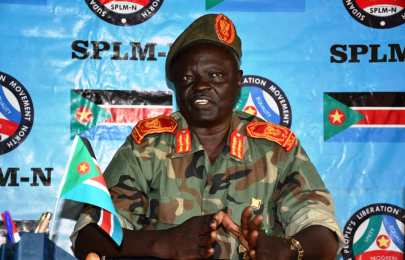SPLM-N’s demand for single army in Sudan does not aim to hamper peace talks: Koko

July 18, 2021 (KHARTOUM) – The Sudan People’s Liberation Movement-North, led by Abdel Aziz al-Hilu, (SPLM-N al-Hilu) denied that its adherence to the formation of a single national army before integrating its forces aims to undermine peace talks and impeding the ongoing efforts to end the war in the Two Areas.
The Declaration of Principles signed on March 28 stipulates that Sudan will have one army. Also, it adds that the SPLM-N forces will be gradually absorbed, until the end of the transitional period and after the separation of religion and state in the constitution.
Also, in the draft framework agreement submitted last May, the SPLM-N al-Hilu proposes to establish the agreed institutions before the start of the transitional period and the integration of its forces into the national army.
In an interview with the Movement’s official website, Izzat Koko, SPLA-N Chief of Staff, stressed that their demand to implement security reforms and form a single national army is not outbidding or escaping from achieving peace.
“By this, we mean specifically reforming the military and security system as a necessary condition that must precede the implementation of security arrangements. otherwise, the state of fragmentation and rupture of the country will continue due to the multiplicity of armies, militias and shadow battalions as well as the spread of weapons even inside the capital,” he said.
“We know well that the forces against change and others hostile to peace are working to obstruct the (ongoing) efforts to achieve a just and sustainable peace. They are the real enemies of the Revolution, the SPLM and the SPLA.”
The SPLA-N chief of staff further said that the political scene in Sudan is open to all possibilities.
He emphasized that the refusal of the military component in the transitional government to reform the security sector indicates the lack of seriousness and the absence of political will to reach sustainable peace.
The Deputy Chairman of the Sovereign Council and General Commander of the Rapid Support Forces (RSF), Mohamed Hamdan Dagalo “Hemetti”, refuses to integrate his forces into the national army.
Last May, there was big tension in Khartoum between the Sudanese army and RSF after al-Burhan’s statements about the integration of militiamen into the unified army.
The signatory armed groups of the Juba Peace Agreement demand the RSF integration into the national army, given that these militias were founded to fight them and protect the ousted regime.
Koko underscored that the mission of the national army is to protect the permanent secular constitution, to defend the Sudanese territory, the sovereignty of the Sudanese state and its people, but not to protect a group or political party.
Some analysts in Khartoum point out that Hemetti’s refusal to integrate his forces aims to protect him from accusations of committing war crimes and crimes against humanity directed against him and his forces.
While others say that his position can be explained by his desire to protect his economic interests and the multiple companies working in mining, roads and trade.
The negotiations are also stalemated over the SPLM-N’s demand to include the Darfur region in the negotiations and “making the unity of Sudan attractive to the peoples of the two regions and Darfur”. Members of the negotiating delegation say that this reminds the Sudanese of the 2005 agreement that led to the separation of South Sudan.
Further, in the context of the separation of religion and state, the SPLM-N demands to change the weekend to Wednesday instead of Friday and Saturday and prevent the use of any religious wording in official correspondence and documents.
The Troika countries recently tried to encourage the SPLM-N to resume the talks and met with the SPLM-N Liberation Council Kauda, South Kordofan. However, the Council issued a statement after the visit, urging the negotiating delegation to stick to its previous positions.
(ST)
